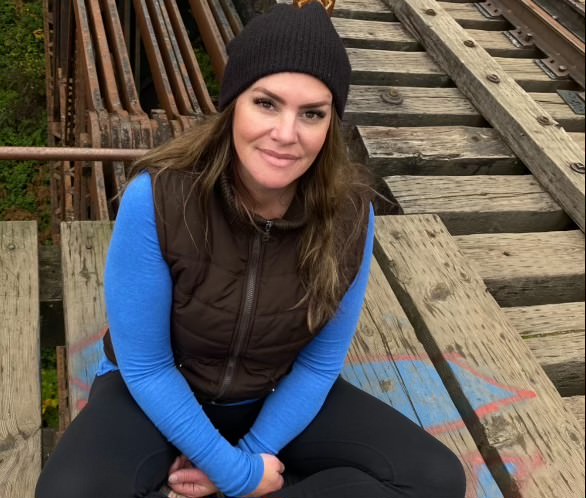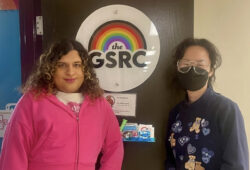As Canada wrestles with a growing demand for access to magic mushrooms by people craving mental health improvement, Capital Current’s Victor Vigas Alvarez takes a four-part look at the ins and outs of this growing debate. Today: Psilocybin, mental health and the law.
Kristine Porter, a B.C. mother of four, had long battled depression when she finally turned to magic mushrooms for relief.
But it was not an easy or speedy trip because she was taking the legal route. She finally obtained access to psilocybin-assisted therapy in 2023 for her Treatment-Resistant Depression.
In 2020, Porter applied for what’s known as a Section 56 exemption from the Controlled Drugs and Substances Act which is available under the Criminal Code of Canada, but she was told that she had to apply through a Special Access Program instead.
At that point, she says, she was at the end of her rope.
“Every day felt like forever,” Porter told Capital Current. “It wasn’t really a question of … if I was going to end my life, but it was more like when and how.”
So feeling defeated she looked for help and turned to an advocacy organization called TheraPsil.
TheraPsil, at that time, was only taking on cases for patients with end-of-life anxiety.
Every day felt like forever. It wasn’t really a question of … if I was going to end my life, but it was more like when and how.”
Kristine Porter, B.C. mother of four treated with psyilocibin
But, they agreed to help and, with the assistance of lawyer Nicholas Pope working on behalf of TheraPsil, Porter was finally granted access to the drug.
“That was a victory,” said Porter, “but with the victories come emotions that aren’t just happy, they’re frustration.
“People can go into a mushroom dispensary and grab some stuff and go on a trip, but the people like me who are saying ‘I want to die and I need help’ have to go through this big process.”
Still Porter, who works in mental health and addictions, started treatment and right away things started to change.
She says her first two sessions of psychedelic-assisted therapy opened her up to things that she had repressed over time.
During her first psilocybin experience, Porter said she was taken back to a memory from her childhood of being abandoned by her mother.
“I didn’t even remember any of that,” said Porter. “I think it speaks volumes that the medicine opened the door to take me to what I would call the first traumatic event of my life.”
“There was nothing fun going on. It was about healing.”
Porter says her depression has since been in remission and that she has not had to use any antidepressants since.
“I think it would be foolish to say it’s cured, but it’s been in remission.”
John Gilchrist, communications manager for TheraPsil, says he believes legalization of medical psilocybin in Canada is overdue, “We’re gonna look back and ask why it took so long.”
The production, sale and possession of magic mushrooms are illegal in Canada, however, Health Canada does grant medical access to psilocybin through two pathways.
One is the Special Access Program (SAP). Through this, a doctor can request permission to administer psilocybin and psilocybin-assisted therapy to a patient with a serious or life-threatening condition where conventional treatments:
- have failed;
- are unsuitable or;
- are not available in Canada
Health Canada has not specified what constitutes serious or life-threatening in order to apply for SAP, however “intractable depression” and “terminal cancer” are mentioned.
It’s a brave thing to want to try psychedelics. They’re not for the faint of heart, but I also think it’s really important to know that it’s safe and okay for you to do, especially if you’re thinking it might not be.
John Gilchrist, advocate for medical psyilocibin, communications manager for TheraPsil
The other legal option is a Section 56 exemption. An individual can apply to have section 56 of the CDSA waived to possess and consume a controlled substance for personal use if they are unable to find treatment any other way. This avenue is used by researchers conducting clinical trials if the Health Minister deems it “necessary for a medical or scientific purpose or is otherwise in the public interest.”
A watershed moment for medical psilocybin in Canada came in 2020, when Thomas Hartle, a Saskatoon man with terminal cancer, became the first person in Canada to legally use psilocybin-assisted psychotherapy to combat his end-of-life anxiety. Hartle was later denied permission to renew the therapy.
Psychedelic Access and Research European Alliance (PAREA), defines psychedelic-assisted therapy as, “The fundamental therapeutic benefit of (Psychedelic-Assisted Therapies) comes from the combination of psychedelic medicine and therapy. The drug is a catalyst for treatment, not a treatment in itself.”
Psychotherapy, or talk therapy, sees a patient and a psychotherapist engage in a long-term process of talking through issues, feelings and past experiences.
In psilocybin-assisted therapy, a psychotherapist offers support and guidance for the patient under the effects of the drug. The presence of the therapist is to safeguard the patient under the influence of the substance. The process also includes psychedelic integration, in which the patient will prepare for and later work through the psychedelic experience.
A 2020 study by researchers at Johns Hopkins University found that psilocybin-assisted therapy was effective in treating what’s know as Major Depressive Disorder (MDD). But it was a randomized trial of only 24 patients.
An earlier study of 51 patients with terminal cancer found high doses of psilocybin produced large decreases of depressed mood and anxiety in terminal cancer patients. Some 80 per cent showed sustained mood improvement six months after ending treatment. This was in 2016.
A further study of 93 patients found that psilocybin-assisted psychotherapy decreased the amount of heavy drinking days for patients with alcohol use disorder. This study was published in 2022 by JAMA Psychiatry.
There are 12 on-going studies in Canada looking into the use of psilocybin-assisted therapy to treat a variety of ailments such as PTSD, alcohol-use disorder, OCD and Major Depressive Disorder.
Gilchrist says that for psilocybin, doctors should be the gatekeepers.
“This is a medical decision. That should be the end of the line.”
Health Canada recently approved legal access to psilocybin to treat a patient’s cluster headaches for the first time in Canada.
Jody Lance, a Calgary man, had been microdosing psilocybin under the counsel of his doctor, but moved to obtain legal approval. Health Canada originally declined Lance’s application, citing insufficient evidence of psilocybin as a treatment for cluster headaches.
Lance’s lawyer, Nicholas Pope, sought judicial review, arguing that Health Canada declining the application violated Lance’s Charter rights to right to life, liberty and security of the person.
Upon review, the federal court reversed course, and granted Lance permission to take eight doses of 12 mg of psilocybin produced by the B.C-based Filament Health when confronted with the onset of a cluster headache attack.
“It should just instantly tell the story of why our government bureaucrats (should not) play a role in any way in these medical decisions,” said Gilchrist.
Gilchrist says TheraPsil is now adding cluster headaches to the cases for which they are willing to assist patients in obtaining psilocybin treatment.
“We hope as an organization that it’s a precedent for what TheraPsil has been pushing for all along, which is doctor as gatekeeper.”
“It’s a brave thing to want to try psychedelics. They’re not for the faint of heart, but I also think it’s really important to know that it’s safe and okay for you to do, especially if you’re thinking it might not be,” he added.




